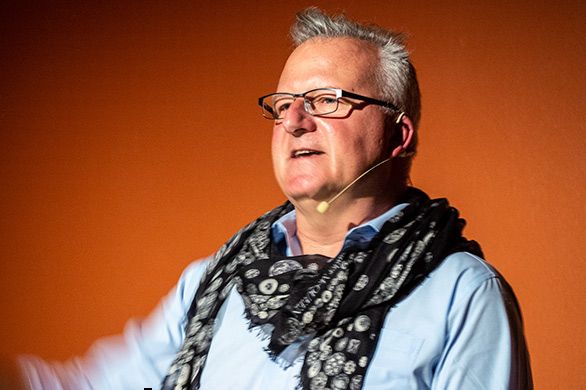Santa Fe Starts the Semester with “Tilling, Toil, and a Lost Vineyard”
February 18, 2020 | By Hannah Loomis

Abe Schoener (A82), a former tutor on the St. John’s Annapolis campus, has spent the last 20 years building a successful career as a winemaker in Los Angeles and New York City, founding the Scholium Project, a winery on the edge of the Los Angeles River, in 2006. Having become somewhat of a cult figure in the wine world, Schoener has been profiled in the New York Times and Food Republic. Recently, he presented a Dean’s Lecture on the St. John’s Santa Fe campus titled “Tilling, Toil, and a Lost Vineyard.” He met with us before the lecture to discuss his path from St. John’s College to urban winemaking—and how a wine can be terrifying.
Has your career in winemaking somehow grown out of your St. John's experiences as a student and a tutor?
It did in all kinds of ways, but for the first several years, as I was plunging myself into winemaking, I didn’t reflect on that. What I did reflect on is the way in which both my time as a student and tutor had prepared me for completely jumping professions, and for my ability to throw myself into winemaking with no training and do a pretty good job pretty quickly. There’s just absolutely no doubt in my mind that every aspect of [winemaking]—the scientific, aesthetic, and business sides—have all been made possible by my St. John’s education.
In the realm of education, there’s not a whole lot of right and wrong—especially not “black and white” right and wrong. In winemaking, there are absolutely black and white questions. In order to make the wine well, you have to get the answer right. You don’t get to discuss your interesting view on it.
How do you approach winemaking? Is there an essence in the fruit or the vineyard that you try to bring out?
There’s a lot of rhetoric associated with winemaking, and to a high degree you can say it’s on the sales and marketing side. In particular, [the idea] that the fruit provides some way of translating or representing the vineyard. There’s a kind of fetishizing of the vineyard, and there is a rhetoric about the unimportance of the winemaker. And I think that’s just false.
Even people who make wine in a nonintrusive way make decisions that have very strong effects on how the wine turns out, and how the vineyard and the fruit are represented in the wine. It’s really important to pay attention to and track the effects of those decisions. There are many ways to allow the vineyard to shine through more and shine through less. But that doesn’t mean there’s one essence of that vineyard or the fruit. One of the reasons I’ve made so many wines is because to get at these questions, you have to try a whole lot of different methods.
Can you say more about how your St. John’s experience translates into winemaking?
It’s one thing to ask whether a wine is delicious. It’s another thing to ask whether it’s beautiful. And a third thing to ask, “is it terrifying, perhaps?”
How do you mean “terrifying?”
Beautiful landscapes like cliffs and exposed rocks can be terrifying, and I think it’s possible for wines to convey the same kind of thing. It’s also possible for wines to convey just the opposite of that, like a placid landscape. It’s a little hard to explain how that happens, but it is a phenomenon we can experience. There are wines that make you feel something like a sense of grandeur, and wines that convey a kind of rusticity.
Early on, those were the things I aimed for in winemaking. And that’s where the terrifying wines come in. I was really interested in making wines that were extreme; different from normal wines.
Do you mean that in the sense of exhilarating?
It was definitely a part of it, but I think I was aiming for wines that were, to some degree, unsettling. For sure, interesting. I made a lot of wines, and I was totally happy for some of the wines to be quite normal. But with some of them I really wanted to push it—not that I wanted the wines to be off-putting, but I still wanted them to be in some way difficult.
What has surprised you most about this career?
The one thing I never thought I was going to learn to do was run a business.
I was also really surprised to learn that winemaking is much more about microbiology than chemistry—something that, as an outsider, I hadn’t grasped.
I read that you are trying to bring winemaking to urban places. How unusual is that in the wine world?
It’s pretty uncommon. We’re doing it already in New York. I work with landowners and grape growers on the North Fork of Long Island, and we truck the fruit to our winery in Brooklyn. Nobody else is doing it exactly the same way in New York. And that’s also what we’re doing in Los Angeles.
It will become more and more common around the world. There was a time when urban wineries were really shocking to people, because we think that winemaking only takes place in the country. Within 10 years, people will be pretty used to the notion of urban wineries.

